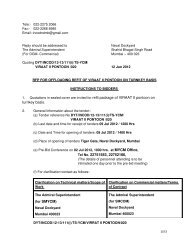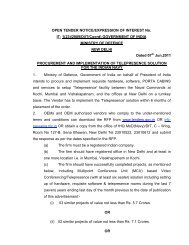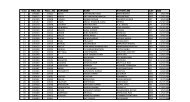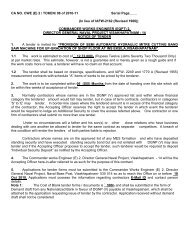deployment of the PLA Navy ships in the - Information Resource ...
deployment of the PLA Navy ships in the - Information Resource ...
deployment of the PLA Navy ships in the - Information Resource ...
You also want an ePaper? Increase the reach of your titles
YUMPU automatically turns print PDFs into web optimized ePapers that Google loves.
FFFFFFFFFFFFFFFFFFF<br />
conferences <strong>of</strong> International Government Experts<br />
held dur<strong>in</strong>g 1971 and 1972. Article 82 appeared<br />
<strong>the</strong>re<strong>in</strong> as Article 71.<br />
The basis for its <strong>in</strong>clusion with<strong>in</strong> <strong>the</strong> Protocol was<br />
that it was observed by <strong>the</strong> world community that<br />
many violations <strong>of</strong> humanitarian law arose from<br />
unfamiliarity with <strong>the</strong> rules <strong>in</strong>volved. In <strong>the</strong> words <strong>of</strong><br />
Mr. Mart<strong>in</strong> <strong>of</strong> <strong>the</strong> International Committee <strong>of</strong> <strong>the</strong> Red<br />
Cross, many experts considered that <strong>the</strong> Geneva<br />
Conventions and <strong>the</strong> draft protocols would be better<br />
applied if <strong>the</strong> commanders <strong>of</strong> military units were<br />
accompanied by legal advisors whose ma<strong>in</strong> task<br />
would be to ensure that <strong>the</strong> armed forces received<br />
appropriate <strong>in</strong>structions and to answer any questions<br />
put to <strong>the</strong>m.<br />
Thus, <strong>the</strong> International Law specifically requires<br />
that <strong>the</strong> commander be provided with a legal advisor<br />
who will be available to advise him <strong>of</strong> Law-<strong>of</strong>-War<br />
implications dur<strong>in</strong>g <strong>the</strong> plann<strong>in</strong>g and execution <strong>of</strong><br />
tactical operations. It implies that <strong>the</strong> Commander's<br />
Judge Advocate will be available to assist <strong>in</strong> <strong>in</strong>struct<strong>in</strong>g<br />
<strong>the</strong> members <strong>of</strong> <strong>the</strong> Command on <strong>the</strong> Conventions<br />
and <strong>the</strong> Protocols. Article 82 thus provides clear<br />
guidance to <strong>the</strong> commander which, if implemented,<br />
should result <strong>in</strong> heightened sensitivity to <strong>the</strong> provisions<br />
<strong>of</strong> <strong>the</strong> Conventions and <strong>the</strong> Protocol. Article 82 to<br />
Protocol-I represents a novel approach to <strong>the</strong> problem<br />
<strong>of</strong> assur<strong>in</strong>g that members <strong>of</strong> military units consider <strong>the</strong><br />
applicability <strong>of</strong> <strong>the</strong> conventions and <strong>the</strong> protocols<br />
dur<strong>in</strong>g <strong>the</strong> conduct <strong>of</strong> <strong>the</strong> tactical operations. Article<br />
82 accomplishes this by provid<strong>in</strong>g <strong>the</strong> Commander<br />
with a legal advisor whose purpose is to advice him<br />
<strong>of</strong> <strong>the</strong> conventions and protocol as <strong>the</strong>y relate to a<br />
particular operation, and by requir<strong>in</strong>g that <strong>the</strong> advisor<br />
provide appropriate advice on <strong>the</strong> <strong>in</strong>structions to be<br />
given to <strong>the</strong> members <strong>of</strong> <strong>the</strong> Command on <strong>the</strong> Law<br />
<strong>of</strong> War.<br />
Article 82 can be characterized as a procedural<br />
provision <strong>in</strong> that it obligates <strong>the</strong> military parties to seek<br />
and obta<strong>in</strong> legal advice relat<strong>in</strong>g to <strong>the</strong> conventions<br />
and <strong>the</strong> Protocol, and to supervise appropriate Law<strong>of</strong>-War<br />
<strong>in</strong>structions.<br />
Commanders Responsibilities<br />
Protocol-I bears duly upon <strong>the</strong> commander to<br />
prevent breaches <strong>of</strong> <strong>the</strong> conventions and <strong>the</strong> Protocol.<br />
It also requires him to personally <strong>in</strong>tervene to limit<br />
breaches by his subord<strong>in</strong>ates. Fur<strong>the</strong>r, it holds him<br />
liable for <strong>the</strong>ir breaches <strong>in</strong> those <strong>in</strong>stances <strong>in</strong> which<br />
he fails to take appropriate action <strong>in</strong> consonance with<br />
<strong>the</strong> conventions and <strong>the</strong> Protocol.<br />
Article 86 <strong>of</strong> <strong>the</strong> Protocol concerns <strong>the</strong><br />
commander's failure to act. It requires <strong>the</strong> parties to<br />
<strong>the</strong> conflict to suppress all breaches <strong>of</strong> <strong>the</strong> conventions<br />
and <strong>the</strong> Protocol which result from a "failure to act<br />
when under a duty to do so".<br />
Provisions <strong>of</strong> Article 86 <strong>of</strong> Protocol-I<br />
• The High Contract<strong>in</strong>g Parties and <strong>the</strong><br />
Parties to <strong>the</strong> Conflict shall repress gave<br />
breaches, and take measures necessary to<br />
suppress all o<strong>the</strong>r breaches, <strong>of</strong> <strong>the</strong> conventions<br />
or <strong>of</strong> this Protocol which result from a failure to<br />
act when under a duty to do so.<br />
• The fact that a breach <strong>of</strong> <strong>the</strong> conventions<br />
or <strong>of</strong> this Protocol was committed by a<br />
subord<strong>in</strong>ate does not absolve his superiors from<br />
penal or discipl<strong>in</strong>ary responsibility, as <strong>the</strong> case<br />
may be, if <strong>the</strong>y knew, or had <strong>in</strong>formation which<br />
should have enable <strong>the</strong>m to conclude <strong>in</strong> <strong>the</strong><br />
circumstances at <strong>the</strong> time, that he was<br />
committ<strong>in</strong>g or was go<strong>in</strong>g to commit such a<br />
breach and if <strong>the</strong>y did not take all feasible<br />
measures with<strong>in</strong> <strong>the</strong>ir power to prevent or<br />
repress <strong>the</strong> breach.<br />
The aforesaid codifies <strong>the</strong> exist<strong>in</strong>g Law <strong>of</strong> War<br />
norm relat<strong>in</strong>g to Command responsibility. It clearly<br />
announces that <strong>the</strong> superior will be held responsible<br />
<strong>in</strong> those <strong>in</strong>stances where he knew or should have<br />
known about real or potential breaches <strong>of</strong> <strong>the</strong> Law <strong>of</strong><br />
War but failed to act.<br />
Article 57 is an important article which is worth<br />
mention<strong>in</strong>g when <strong>the</strong> responsibilities <strong>of</strong> commander<br />
is be<strong>in</strong>g discussed. Article 57 entitles precautions <strong>in</strong><br />
attack, sets forth uniform guidance for <strong>the</strong><br />
commander or his responsibility to civilians and to <strong>the</strong><br />
civilian population <strong>in</strong> carry<strong>in</strong>g out attacks aga<strong>in</strong>st<br />
military objectives.<br />
Article 82 and <strong>the</strong> Judge Advocate's Role<br />
Article 82 provides <strong>the</strong> Legal Advisor / Judge<br />
Advocate a responsibility to significantly <strong>in</strong>crease <strong>the</strong><br />
impact he may have on advis<strong>in</strong>g <strong>the</strong> Command to<br />
FFFFFFFFF SEPTEMBER 2010<br />
FFFFFFFFF54



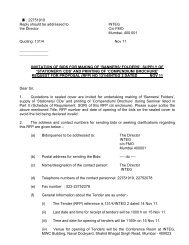
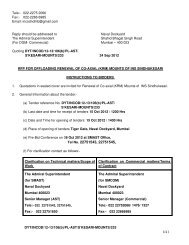
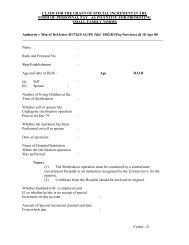
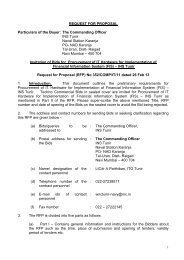
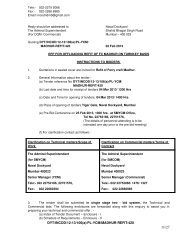
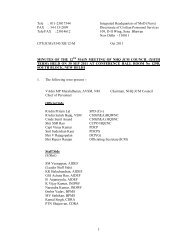

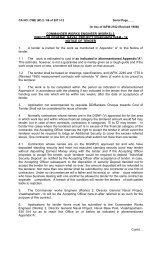
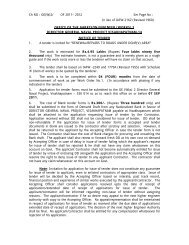
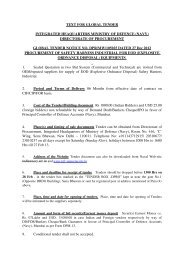
![DGNP[V] - Irfc-nausena.nic.in](https://img.yumpu.com/23509938/1/158x260/dgnpv-irfc-nausenanicin.jpg?quality=85)
